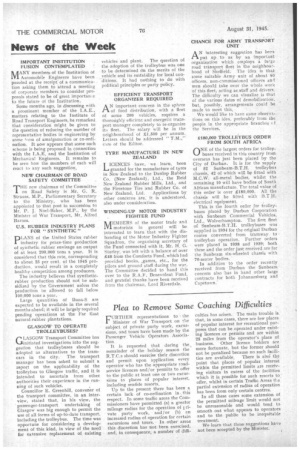News of the Week
Page 16

If you've noticed an error in this article please click here to report it so we can fix it.
IMPORTANT INSTITUTION FUSION CONTEMPLATED '
hilANY members of the Institution of 1V1 Automobile Engineers have been puzzled at the receiptof a communication asking them to attend a meeting of corporate members to consider proposals stated to be of great importare e to the future of the Institution.
Some months ago, in discussing with a prominent member of the I.A.E., matters relating to the Institute of Road Transport Engineers, he remarked that consideration might be given to the question of reducing the number of representative bodies in engineering by some form of amalgamation or co-ordination. It now appears that some such scheme is being proposed in connection with the I.A.E. and the Institution of Mechanical Engineers. It remains to be seen how the members of each will react to any such suggestion.
NEW CHAIRMAN OF ROAD SAFETY COMMITTEE •
THE new chairman of the Committee on Road Safety is Mr. G. R. Strauss, M.P., Parliamentary Secretary to the Ministry, who has been appointed to that post in succession to Mr. P. J. Noel-Baker, M.P., by the Minister of War Transport, Mr. Alfred Barnes.
U.S. RUBBER INDUSTRY PLANS FOR " SYNTHETIC "
pIANS of the United States rubber industry for peace.time production of synthetic rubber envisage an output of at least 200,000 tons a year. It is considered that thie rate, corresponding to about 25 per cent, of the 1945 proclurAion, would result in a completely healthy competition among producers.
The industry believes that syntheticrubber production should not be subsidized by the Government unless the production be allowed to fall below 100,000 tons a year. Large quantities of Buna-S are expected to be available in the several months ahead; it will be largely required pending operations at the Far East natural-rubber plantations.
GLASGOW-TO OPERATE TROLLEYBUSES?
GLASGOW Transport Committee has initiated investigations into the suggestion that trolleybuses should be adopted as alternatives to the tramcars iu the city. The transport manager has been asked to submit a report on the applicability of the trolleybus to Glasgow traffic, and it is intended to ascertain from other authorities their experience in the running of such vehicles.
Councillor E. Greenhill, convener of the transport committee, in an interview, stated that, in his view, the ' passenger-transport undertaking of Glasgow was big enough to permit the use of all forms of up-to-date transport, including the trolleybus. The time was opportune for cdnsidering a development of this kind, in view of the need for extensive replacement of existing vehicles and plant. The question of the adoption of the trolleybus was one to be determined On the merits of the vehicle and its suitability for local conditions. It had nothing to do with political principles or party policy.
EFFICIENT TRANSPORT ORGANIZER REQUIRED
AN important concern in the sphere of food distribution, with a fleet of some 200 vehicles, requires a thoroughly efficient and energetic transport manager completely to re-organize its fleet. The salary will be in the neighbourhood of £1,500 per annum. Letters should be addressed "
care of the Editor.
TYRE MANUFACTURE IN NEW ZEALAND
LICENCES have, we learn, been LA granted for the manufacture of tyres in New Zealand to the Dunlop Rubber Co. (New Zealand), Ltd., the Reid New Zealand Rubber Mills, Ltd., and the Firestone Tire and Rubber Co. of
New Zealand, Ltd. Applications by other concerns are; it is understood, also under consideration.
WINDING-UP MOTOR INDUSTRY FIGHTER FUND N/IEMBERS of the motor trade and /Yi motorists in general will be interested to learn that with the disbanding of the Motor Industry Fighter Squadron, the organizing secretary of the Fund connected with it, Mr. H. G. Starley, was left with a balance of over .£48 from the Comforts Fund, which had provided books, _games, etc„ for the pilots and ground staff during the war. The Committee decided to hand this over to the R.A.F. Benevolent Fund, and grateful thanks have been received from the chairman, Lord Riverdale.
A N interesting suggestion has been (-1 put up to us by an important organization which employs a larg-.1 road transport fleet in the neighbourhood of Sheffield. The idea is that some suitable Army unit of about 60 officers, non-commissioned officers ant men should take over the whole work of this fleet, acting as staff and drivers. The difficulty we can visualize is that of the various dates of demobilization, but, possibly, arrangements could be made to meet this,
We would like to have some observations on this idea, preferably from the people in the appropriate bra-aches r f the Services..
£.180,000 TROLLEYBUS ORDER FROM SOUTH AFRICA
ONE of the largest orders for trolley. buses-received in this country from overseas has just been placed by the City of Durban. It is for the supply of 52 Sunbeam-B.T.H. trolleybus chassis, 42 of which will be fitted with M.C.W. all-metal bodies, whilst the remaining 10 will haVe bodies of South African manufacture. The total value of this order is over £180,000. All the chassis will be fifted with B.T H. electrical equipment.
This, is the fourth order for trolleybuses placed by Durban Corporation with Sunbeam Commercial Vehicles, Ltd., Wolverhampton. The first fleet of Sunbeam-B.T.H. trolleybuses was supplied in 1934 for the original Durban routes converted from tramway to trolleybus operation. Further orders were placed in 1938 and 1939; both these and the order just received are for the Sunbeam six-wheeled chassis with 70-seater bodies.
In addition to the order recently received from Durban the Sunbeam concern also has in hand other large contracts for both Johannesburg and Capetown;




















































